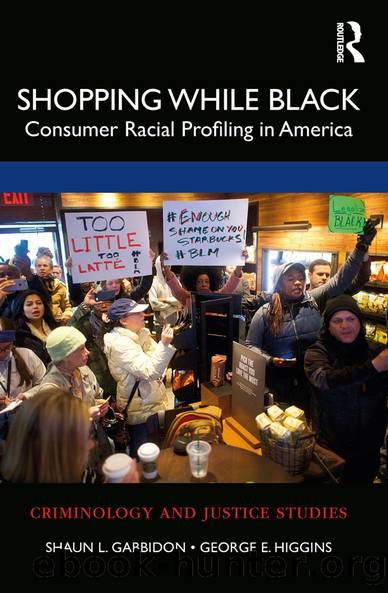Shopping While Black by Shaun L. Gabbidon George E. Higgins

Author:Shaun L. Gabbidon, George E. Higgins [Shaun L. Gabbidon, George E. Higgins]
Language: eng
Format: epub
Tags: Social Science, Discrimination, Black Studies (Global), Privacy & Surveillance, Ethnic Studies, General, Sociology, Social Theory
ISBN: 9781000071665
Google: tXznDwAAQBAJ
Publisher: Routledge
Published: 2020-05-25T03:50:43+00:00
Internal Responses
Regardless of whether the respondent reports their consumer racial profiling incident or not, the experience tends to have some psychological impact. That is, following an incident of consumer racial profiling, some negative emotion may arise. Here, we address the following question: What types of negative emotions occur because of consumer racial profiling? Sixty-four percent of the respondents believed that their consumer racial profiling experience was stressful. Nearly ninety percent (88%) reported that experiencing consumer racial profiling angered them. Slightly more than half of the respondents were shocked (51%), saddened (55%), or embarrassed (54%) by the incident. For a small percentage (29%), the experience of consumer racial profiling did not negatively affect their self-worth. Finally, 63% of the respondents believed that experiencing consumer racial profiling negatively impacted on them.
Next, we further probe these emotional reactions by examining gender and race/ethnicity separately. More females (66%) than males (60%) believed that consumer racial profiling was stressful. Similarly, more females (89%) than males (86%) believed that consumer racial profiling angered them. Females reported higher rates of the following emotions than males: shock (54%â46%), sadness (58%â51%), and embarrassment (55%â50%). More males (32%) believed that consumer racial profiling negatively influenced their self-worth than females (27%). These percentages closely align and suggest thatâin contrast to the stereotype of the emotionless maleâmales that are victims of CRP experience a full range of emotions. On the whole, the survey also found that a marginally higher percentage of females (64%) than males (60%) believed that consumer racial profiling had a negative effect on them.
Examining the percentages by race reveals that Whites have higher rates in all emotional responses except being embarrassed. The findings indicate that a higher percentage of Blacks (57%) than Whites (46%) were embarrassed because of their CRP experiences. Figure 3.4 disaggregates the percentages by sex and race/ethnicity together. The percentages show that White females (83%) more so than White males (59%) and Black females (63%) more than Black males (59%) felt stressed because of CRP. The same can be said about all of the emotional measures.
Download
This site does not store any files on its server. We only index and link to content provided by other sites. Please contact the content providers to delete copyright contents if any and email us, we'll remove relevant links or contents immediately.
Cecilia; Or, Memoirs of an Heiress — Volume 1 by Fanny Burney(32538)
Cecilia; Or, Memoirs of an Heiress — Volume 2 by Fanny Burney(31935)
Cecilia; Or, Memoirs of an Heiress — Volume 3 by Fanny Burney(31925)
The Great Music City by Andrea Baker(31911)
We're Going to Need More Wine by Gabrielle Union(19032)
All the Missing Girls by Megan Miranda(15925)
Pimp by Iceberg Slim(14476)
Bombshells: Glamour Girls of a Lifetime by Sullivan Steve(14046)
For the Love of Europe by Rick Steves(13868)
Talking to Strangers by Malcolm Gladwell(13341)
Norse Mythology by Gaiman Neil(13332)
Fifty Shades Freed by E L James(13228)
Mindhunter: Inside the FBI's Elite Serial Crime Unit by John E. Douglas & Mark Olshaker(9313)
Crazy Rich Asians by Kevin Kwan(9271)
The Lost Art of Listening by Michael P. Nichols(7487)
Enlightenment Now: The Case for Reason, Science, Humanism, and Progress by Steven Pinker(7303)
The Four Agreements by Don Miguel Ruiz(6739)
Bad Blood by John Carreyrou(6609)
Weapons of Math Destruction by Cathy O'Neil(6260)
